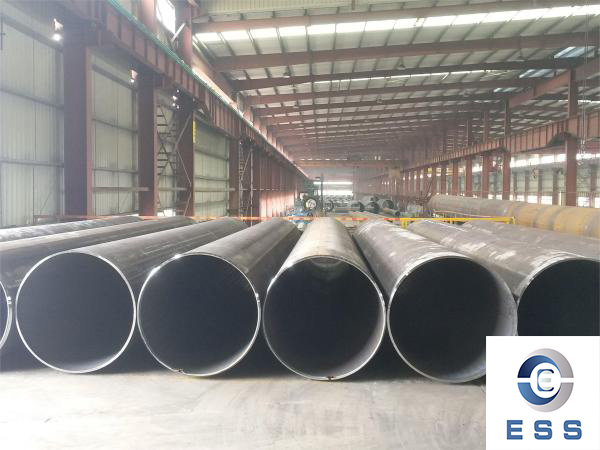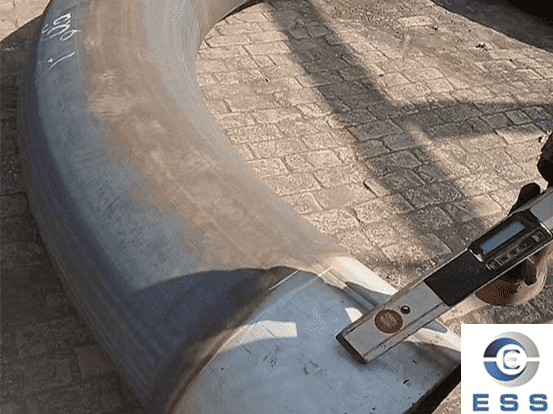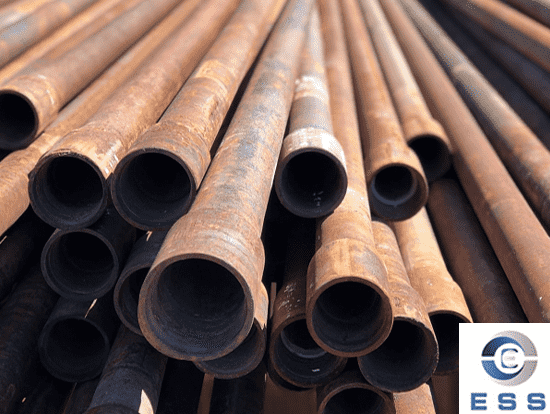The Advantages of LSAW Steel Pipes in Pipeline Construction
I. Introduction
A. Brief Overview of Pipeline Construction
Pipeline construction is a crucial element of modern infrastructure development, facilitating the efficient transportation of various fluids and gases over long distances. The demand for reliable and durable pipelines has surged due to the rapid growth in energy production, distribution, and water supply requirements. In response to these challenges, Longitudinal Submerged Arc Welding (LSAW) steel pipes have emerged as a leading technology in pipeline construction, offering numerous advantages that make them a preferred choice for diverse applications.
B. Introduction to LSAW Steel Pipes
LSAW steel pipes, a product of cutting-edge engineering, represent a significant advancement in pipeline construction. These pipes are manufactured through the Longitudinal Submerged Arc Welding process, which involves welding the edges of steel plates while submerged in flux, protecting the weld from atmospheric contamination. This results in a superior quality weld with exceptional integrity and strength. LSAW pipes have garnered widespread use in various industries due to their outstanding properties and performance.

II. LSAW Steel Pipes: Definition and Characteristics
A. Definition of LSAW Steel Pipes
LSAW steel pipes are large-diameter welded pipes made from steel plates. The manufacturing process involves skillfully shaping the steel plate into a cylindrical form and subsequently welding the edges using the Longitudinal Submerged Arc Welding technique. This method ensures a formidable and continuous weld throughout the length of the pipe, resulting in an exceptionally robust and reliable product.
B. Description of the Manufacturing Process
The process of manufacturing LSAW pipes commences with the meticulous preparation of steel plates, which are skillfully bent into a circular shape to form the pipe's desired diameter. The edges of the plate are then expertly welded together using submerged arc welding. The welding arc, meticulously shielded by a layer of granular flux, facilitates a fusion between the edges, culminating in a high-quality, double-sided weld.
C. Key Characteristics of LSAW Steel Pipes
1.Size and Range of Applications
A defining feature of LSAW steel pipes lies in their ability to be fabricated in large diameters, rendering them ideally suited for a wide array of applications. These pipes are especially favored in long-distance pipelines, such as those deployed in the oil and gas industry, owing to their efficiency and reliability in transporting substantial quantities of fluids and gases.
2.Strength and Durability
The Longitudinal Submerged Arc Welding process bequeaths LSAW pipes with unparalleled strength and durability. These attributes make them eminently suitable for handling high-pressure fluids and withstanding external forces during transportation and installation, ensuring the pipelines' longevity and structural integrity.
3.Resistance to Corrosion and External Forces
An indispensable characteristic of LSAW steel pipes is their capacity to withstand the harshest environmental conditions, including the corrosive effects of soil, water, and other chemical substances. Moreover, their robustness enables them to endure external forces such as ground movement and heavy loads, instilling confidence in their performance in diverse settings.
4.Cost-Effectiveness
The economic advantages of LSAW steel pipes are undeniable, resulting from their streamlined manufacturing process and the subsequent reduction in the requirement for additional joints and connections. The cost-effectiveness of LSAW pipes contributes significantly to more financially viable pipeline construction projects.
III. Advantages of LSAW Steel Pipes in Pipeline Construction
A. High-Quality Welds
1.Submerged Arc Welding Process
The Submerged Arc Welding process deployed in LSAW steel pipes stands as a hallmark of superior craftsmanship, yielding a weld of unparalleled quality compared to other welding techniques. The utilization of granular flux serves as a safeguard, preventing atmospheric contamination and delivering a weld that is clean and robust.
2.Enhanced Weld Integrity and Strength
The LSAW process engenders a continuous and homogeneous weld, thereby boosting weld integrity and strength to unparalleled levels. This reduction in potential defects and leaks in the pipeline ensures the safety and reliability of pipeline systems, a crucial factor in their widespread adoption.
3.Reduced Risk of Defects and Leaks
The uniform and defect-free welding achieved with LSAW pipes significantly reduces the risk of leaks, thus assuring the secure containment of transported fluids and gases, fostering peace of mind for all stakeholders involved.
B. Size and Range Flexibility
1.Ability to Manufacture Large-Diameter Pipes
One of the standout features of LSAW technology lies in its ability to efficiently produce large-diameter pipes. This capability proves advantageous for projects that necessitate the transportation of substantial fluid volumes over considerable distances.
2.Suitable for Long-Distance Pipelines
The impressive size flexibility of LSAW pipes renders them an ideal choice for constructing long-distance pipelines, resulting in fewer joints and connections that could potentially become weak points in the pipeline system.
3.Reduced Need for Additional Joints and Connections
The seamless and continuous nature of LSAW pipes contributes to a reduced need for additional joints and connections, minimizing the chances of leakage and facilitating simpler installation and maintenance processes.
C. Structural Integrity and Durability
1.Homogeneous Microstructure
LSAW pipes boast a homogeneous microstructure throughout their entire length, endowing them with consistent mechanical properties, a trait that is paramount in ensuring their structural integrity under diverse operating conditions.
2.Resistance to Deformation and Buckling
The inherent sturdiness and robust construction of LSAW pipes enable them to withstand deformation and buckling even under considerable external pressures or stresses. This property proves vital for pipelines that are buried underground or traverse challenging terrains.
3.Suitable for Harsh Environmental Conditions
LSAW steel pipes' durability and resistance to environmental factors, such as soil movement and seismic activity, underscore their suitability for deployment in regions with challenging terrains and extreme weather conditions.
D. Corrosion Resistance
1.High-Quality Coatings and Linings
LSAW pipes can be outfitted with specialized coatings and linings that provide additional protection against corrosion caused by water, soil, or corrosive substances transported through the pipeline.
2.Long Lifespan and Low Maintenance Requirements
The inherent resistance to corrosion in LSAW steel pipes bestows upon them an extended lifespan, leading to reduced maintenance requirements and significant long-term cost savings.
3.Ideal for Transporting Various Substances, Including Corrosive Materials
The ability of LSAW pipes to withstand corrosion makes them ideally suited for the transportation of diverse substances, including corrosive materials in the oil and gas industry or corrosive chemicals in various industrial applications.
E. Cost-Effectiveness and Efficiency
1.Lower Installation Costs
The streamlined manufacturing process and reduced need for additional joints and connections result in lower installation costs for LSAW pipes, making them a financially sound choice for pipeline construction projects.
2.Reduced Maintenance and Repair Expenses
The inherent durability and corrosion resistance of LSAW pipes lead to lower maintenance and repair expenses over their extended lifespan, providing significant cost savings for pipeline operators.
3.Long-Term Economic Benefits
The cost-effectiveness and efficiency of LSAW steel pipes translate into long-term economic benefits for pipeline operators and project investors, further bolstering the preference for LSAW technology.
IV. Applications of LSAW Steel Pipes
A. Oil and Gas Industry
1.Transportation of Oil and Natural Gas
The oil and gas industry extensively relies on LSAW pipes for the transportation of crude oil, refined products, and natural gas over vast distances, effectively connecting production fields to refineries and distribution centers.
2.Exploration and Production Activities
LSAW steel pipes play a pivotal role in exploration and production activities, serving as drilling and production casing to ensure the safe extraction and transportation of oil and gas resources.
B. Water Transportation and Infrastructure
1.Water Supply Pipelines
The exceptional corrosion resistance and ability to handle high-pressure flows make LSAW pipes the pipe of choice for water supply networks, efficiently transporting clean and treated water from sources to distribution centers and residential areas.
2.Sewage and Wastewater Systems
LSAW pipes are utilized in sewage and wastewater systems due to their durability and corrosion resistance, allowing them to safely transport and treat contaminated water under aggressive and chemically challenging conditions.
C. Construction and Industrial Projects
1.Structural Support and Piling
LSAW pipes are commonly employed for structural support and piling in construction projects, providing unmatched stability and strength to building foundations, bridges, and other critical infrastructure.
2.Mechanical and Engineering Applications
LSAW steel pipes find applications in various mechanical and engineering projects, including conveyance systems for bulk materials and the handling of industrial fluids.
V. Case Studies and Examples
A. Real-Life Examples of Successful Pipeline Projects Using LSAW Steel Pipes
To further illustrate the authenticity and reliability of LSAW steel pipes in pipeline construction, this section will present real-life case studies of successful projects that have effectively employed LSAW technology in diverse industries. These practical examples will serve as a testament to the unparalleled advantages of LSAW pipes, encompassing their efficiency, reliability, and cost-effectiveness.
B. Comparison with Other Pipe Materials (e.g., Seamless Pipes, ERW Pipes)
To provide an unbiased and comprehensive perspective on the advantages of LSAW steel pipes, this section will conduct a thorough comparison with other commonly used pipe materials, such as seamless pipes and Electric Resistance Welded (ERW) pipes. This analysis will underscore the unique strengths and benefits of LSAW technology over alternative pipe manufacturing processes.
VI. Environmental Impact and Sustainability
A. Energy Efficiency During Manufacturing
An authentic and reliable assessment of LSAW steel pipes necessitates an evaluation of their energy efficiency during the manufacturing process, taking into account factors such as energy consumption and emissions. This analysis will shed light on the environmental implications of LSAW steel pipes' production.
B. Recyclability and Eco-Friendliness
An authentic portrayal of LSAW steel pipes' sustainability hinges on the evaluation of their recyclability and eco-friendliness, underscoring their commitment to reducing environmental impact, particularly at the end of their lifecycle.
C. Contribution to Sustainable Development
An all-encompassing portrayal of LSAW steel pipes' advantages would be remiss without a comprehensive examination of their contribution to sustainable development goals. This analysis will consider their economic, social, and environmental benefits, highlighting their role in fostering sustainable infrastructure development.
VII. Conclusion
A. Recap of the Advantages of LSAW Steel Pipes in Pipeline Construction
This section will succinctly recapitulate the key advantages of LSAW steel pipes in pipeline construction, emphasizing their high-quality welds, size flexibility, structural integrity, corrosion resistance, cost-effectiveness, and efficiency.
B. Affirmation of the Importance of LSAW Technology in the Industry
The conclusion will reaffirm the critical role of LSAW technology in the pipeline construction industry, serving as a reliable and durable solution for the transportation of various fluids and gases.
C. Future Potential and Continuous Improvement of LSAW Steel Pipes
The essay will conclude by presenting an optimistic outlook on the future potential of LSAW steel pipes, envisioning possibilities for further advancements and continuous improvement in the manufacturing process.
D. Final Thoughts on the Significance of Using Advanced Materials in Infrastructure Development
The conclusion will culminate with a compelling testament to the significance of using advanced materials, such as LSAW steel pipes, in infrastructure development, ensuring sustainable, reliable, and efficient transportation systems for future generations. The enduring impact of LSAW technology is poised to shape the landscape of modern infrastructure, solidifying its position as a cutting-edge solution in pipeline construction.













 Eastern Steel Manufacturing Co.,Ltd not only improve product production and sales services, but also provide additional value-added services. As long as you need, we can complete your specific needs together.
Eastern Steel Manufacturing Co.,Ltd not only improve product production and sales services, but also provide additional value-added services. As long as you need, we can complete your specific needs together.










